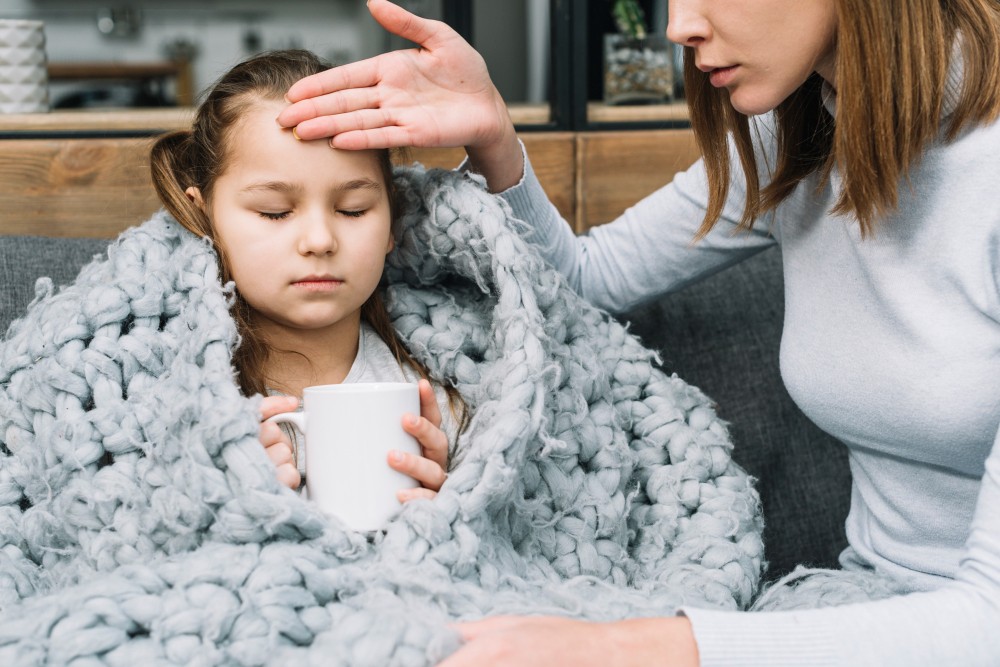What is Strep Throat?
Strep throat is a common, highly-contagious illness caused by bacteria rather than a virus. Group A Streptococcus is the bacterial culprit for strep throat, and it is easily spread through direct contact and respiratory droplets. Strep can be quite painful, but easily treated with antibiotics.

Causes and Symptoms
How do you know if your sore throat is something more serious? Strep throat, while similar to a sore throat caused by a virus, often comes with a few unique symptoms that will tell you it’s time to schedule an appointment with your primary care provider. Some of these symptoms include:
- Swollen, red tonsils
- Pain when swallowing
- Fever
- Sudden, very red sore throat
- White patches on the tonsils
- Swollen lymph nodes
- Small, red spots on the roof of the mouth
Diagnosis of Strep Throat: Testing and Identification
The best way to determine if your sore throat is strep throat or not is by scheduling an appointment for a PCR strep test at our Omaha clinic.
The PCR strep test is completed in the clinic with results available in about 30 minutes. If the results are positive, Nebraska Home Pediatrics & Parents offers the first dose of antibiotics in the clinic to help you or your child start feeling better as quickly as possible.
Strep Throat vs. Sore Throat: Recognizing the Difference
Since strep throat is a bacterial infection, it can present differently than a viral sore throat. A fever is often a telltale sign of strep throat, and can sometimes even be accompanied by stomach pain, vomiting, headache, and/or a rash.
If you or your child also have a runny nose, cough, conjunctivitis (pinkeye), or hoarseness of voice, these are good signs that the culprit is likely not strep throat. These are more commonly viral symptoms and will go away without antibiotics. Influenza, the common cold, and RSV are often common culprits.
When to Seek Medical Attention
The faster you can treat strep throat, the better, in order to prevent the spread of illness and an excessive period of pain and discomfort. If you or your child has any of the following symptoms with their sore throat, it’s important to schedule an appointment with your medical provider right away to rule out or quickly treat strep throat.
- Sudden, severe sore throat
- Fever
- Difficulty swallowing
- Nausea
- Rash
- Vomiting
- Stomach pain
If strep throat goes untreated, serious complications can occur. Kidney inflammation, rheumatic fever, and issues from rheumatic fever like joint inflammation, rash, and heart valve damage are all potential risks of untreated strep throat.

Strep Throat Treatment Options: Antibiotics and Beyond
Once diagnosed, your medical provider will walk you through a variety of strep throat treatment options, which will likely include an antibiotic. It’s important to take an antibiotic exactly as directed in order to get better as quickly and effectively as possible. Antibiotics should help relieve symptoms within 24-48 hours. If you or your child aren’t feeling better within a couple days, you will need to contact us again to speak with your medical provider about further treatment.
For both adults and kids, the pain of strep throat can feel extreme! There are ways to relieve your strep throat symptoms while you wait for antibiotics to work, including:
- Over-the-counter pain relievers like ibuprofen or acetaminophen (do not give aspirin to children under 18 years of age)
Plenty of rest - Hydration – popsicles, soup, and tea are all soothing ways to stay hydrated while easing sore throat pain.
- Honey (ages 1 year and older)
- Gargling with warm salt water
- Cool mist humidifier
Preventing the Spread of Strep Throat
If someone in your home has strep throat, there are steps you can take to try to prevent the spread of illness.
- Regular, thorough hand washing with soap and warm water
- Coughing or sneezing into your elbow or a tissue
- Avoid sharing personal items and food or drink
- Stay home
As long as you or your child is no longer experiencing symptoms and are not having fever, normal activities (like school and work) can typically be resumed 12-24 hours after beginning antibiotics. Your medical provider will give you guidance for your specific case at your appointment.

Strep Throat in Children: Special Considerations
Strep throat is not common in children under three years of age, but it does happen occasionally. In these instances, the child may show symptoms like fever, fussiness, and a loss of appetite. Children of this age do not seem to be as at risk as older children for more severe complications.
When to See a Doctor: Red Flags and Emergency Signs
Strep throat rarely causes emergency symptoms, but if you or your child is experiencing any of the following, it’s time to call your medical provider or head into urgent care.
- Difficulty breathing
- An inability to swallow
- Shortness of breath
- Loss of voice
- High fever
- Swelling of the throat
- Difficulty opening mouth

Schedule an appointment for strep throat testing today!
At Nebraska Home Pediatrics & Parents, we know how painful and disruptive strep throat can be! If you’re worried that you or someone in your family has strep throat, please call us today and schedule an appointment.